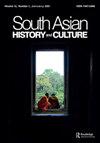Utopias of the past: a reading of A. K. Forbes’ Ras Mala
IF 0.3
0 ASIAN STUDIES
引用次数: 0
Abstract
ABSTRACT Alexander Kinloch Forbes, a British colonial official, wrote the Ras Mala, a history of Gujarat, in 1856. When he was looking for sources for writing this history, he received a response from his interlocutors in Gujarat that itihasa resides in the volumes of kavya. The essay attempts to understand this response, and study the shared genealogies of history and poetry in the context of nineteenth century Gujarat. It argues that the shared genealogies of itihasa and kavya in Gujarati discursive traditions sustained a plural vision of the past. This plural vision stood at variance from the one that was projected through the European teleological project of history in the nineteenth century Enlightenment philosophy and the Kantian model of education. The essay proposes to read Forbes’ Ras Mala in the light of the shared genealogy of itihasa and kavya to understand how it both contests and collaborates with the dominant European modes of constructing the past. In the light of Ashish Nandy’s concept of the open past, the paper seeks to understand what visions of utopias Ras Mala had to offer on the site of colonial modernity.过去的乌托邦:读a.K.福布斯的《拉斯马拉》
摘要:1856年,英国殖民地官员亚历山大·金洛克·福布斯撰写了古吉拉特邦历史书《拉斯马拉》。当他寻找书写这段历史的来源时,他从古吉拉特邦的对话者那里得到了回应,称itihasa存在于《卡夫亚》的卷中。本文试图理解这种反应,并在19世纪古吉拉特邦的背景下研究历史和诗歌的共同谱系。它认为,古吉拉特邦话语传统中itihasa和kavya的共同家谱维持了对过去的多元愿景。这种多元视野与19世纪启蒙哲学和康德教育模式中欧洲历史目的论项目所投射的视野不同。本文建议根据itihasa和kavya的共同谱系来阅读《福布斯》的Ras Mala,以了解它是如何与欧洲主导的构建过去的模式竞争和合作的。本文从阿希什·南迪关于开放的过去的概念出发,试图理解拉斯马拉乌托邦在殖民地现代性的舞台上所提供的愿景。
本文章由计算机程序翻译,如有差异,请以英文原文为准。
求助全文
约1分钟内获得全文
求助全文

 求助内容:
求助内容: 应助结果提醒方式:
应助结果提醒方式:


